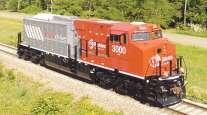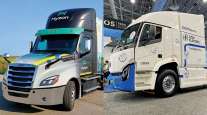Contributing Writer
New Toyota Fuel Cell System Close to Being Available to Class 8 Makers

[Stay on top of transportation news: Get TTNews in your inbox.]
Toyota Motor Corp. unveiled a second-generation fuel cell system that is nearing the point when it could be offered to heavy-duty truck builders looking to build hydrogen-powered tractors.
The new fuel cell stack is based on the system that is in Toyota’s 2021 Mirai passenger sedan that goes on sale this month. But it is double the size to handle the power needs of a Class 8 truck.
“Our first prototype trucks proved that a fuel cell electric powertrain was capable of hauling heavy cargo on a daily basis. These new prototypes not only use production-intent hardware, they will also allow us to start looking beyond drayage into broader applications of this proven technology,” Andrew Lund, chief engineer at Toyota Motor North America Research and Development, said in a Dec. 10 news release.
Labeling the new system “production-intent” points toward commercialization barring some unexpected hitch. It will go into trucks driving “drayage routes at Southern California’s ports to validate their performance, efficiency and drivability,” the company said.

In this special two-part year in review, we look at the technology and regulatory developments that will help you and your business in 2021. Transport Topics Reporter Eleanor Lamb and Managing Editor for Features Seth Clevenger discuss HOS, software, equipment and more. Hear a snippet, above, and get the full program by going to RoadSigns.TTNews.com.
The powertrain will work with the Kenworth T680 chassis, a chassis built by Hino (Toyota’s heavy-duty truck subsidiary) and potentially equipment from other manufacturers.
The new design uses a smaller compact hydrogen storage cabinet behind the cab that houses six hydrogen tanks with the same capacity as the previous prototype trucks. Engineers also added a more powerful lithium-ion battery to the powertrain to smooth the flow of electricity to the motors.
Toyota said the second-generation fuel cell system would deliver more than 300 miles of range at a full load weight of 80,000 pounds.
The automaker’s investment demonstrates how quickly electric-drive tech and components can be scaled and transferred across vehicle platform sizes, including between light-duty and heavy-duty applications, said Bill Van Amburg, executive vice president of Calstart, a Pasadena, Calif., nonprofit clean transportation industry consortium.
“This capability to transfer modular systems is a game changer in production,” Van Amburg said.
It also shows Toyota is investing to keep up with the other major players leaning into fuel cells for heavy-duty commercial vehicles, he said. Daimler Trucks, Volvo, Hyundai and Cummins all are working on fuel cell trucks.
The Toyota system's 300-mile range will work for drayage and regional haul — mostly carriers that operate longer corridor or hub-and-spoke applications. But the real advantage of fuel cell trucks is longhaul freight, which requires a longer range, Van Amburg said.

Van Amburg
Fuel cell trucks also will have an advantage over battery-electric trucks for long-distance hauling because the fueling time is about the same as a diesel vehicle, said Raghu Kilambi, CEO of Powertap Hydrogen Corp., a Newport Beach, Calif., hydrogen filling station developer.
He said truckers and motor carriers will prefer fuel cell trucks to battery-electric trucks because adding hours of charging to a longhaul trip cuts profits and revenue.
Toyota also is pushing forward with testing of the previous system. The first two of 10 tractors using the prior-generation fuel cell stack powertrain and a Kenworth T680 chassis are entering operations for Toyota Logistics Services and Southern Counties Express at the ports of Los Angeles and Long Beach this month. The remainder will be delivered next year to customers that include UPS Inc. and Total Transportation Services.
The pilot program is part of a $41 million Zero and Near-Zero Emissions Freight Facilities grant awarded by the California Air Resources Board.
“We have been involved with Toyota’s hydrogen truck project since the beginning, and we are excited to see the latest models now being released for further testing,” Southern Counties Express President Gordon Reimer said in a Dec. 10 news release.
The drayage company is a division of Warren, Mich.-based Universal Logistics, which ranks No. 27 on the Transport Topics Top 100 list of the largest for-hire carriers in North America.
Moving to zero-emission trucking is part of Toyota’s goal to almost completely eliminate CO2 emissions from its vehicles, operations and supply chain by 2050, the company said.
Want more news? Listen to today's daily briefing:
Subscribe: Apple Podcasts | Spotify | Amazon Alexa | Google Assistant | More




